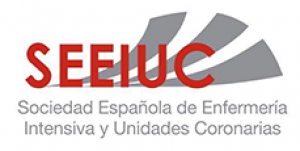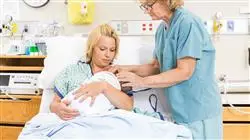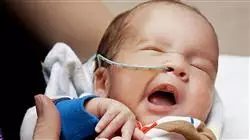University certificate
Scientific endorser

The world's largest faculty of nursing”
Description
With the online Postgraduate diploma in Newborn Nutrition and Feeding for Nursing you have the opportunity to update your knowledge in a practical way and without renouncing to the maximum scientific rigor, to incorporate the latest advances in nursing care of the newborn"

Neonatal feeding is one of the most important aspects in the design of care plans. The idiosyncrasy of the newborn and its fragility means that all patterns of basic needs have to be covered in a much more precise and sensitive way. This context makes the updating of the procedures in the care performed in the neonatal intensive care unit by the nursing professional of paramount importance to maintain care based on the latest scientific evidence and to ensure the safety of the baby.
This course includes the most relevant topics about the admission of the newborn to the neonatology service or NICU, the knowledge and management of water, electrolyte and metabolic disorders of the newborn, as well as the digestive disorders they may suffer, their feeding patterns and the medical-legal aspects in neonatology. In addition, it places special emphasis on the implementation of measures to improve patient safety in the Neonatal Unit, providing relevant knowledge on food and routes of administration, dosage, preparation, monitoring, side effects and incompatibilities.
The Postgraduate diploma in nutrition and feeding in the newborn for nurses allows, in a practical way, to achieve this update of the most used procedures to contribute with quality and safety to the recovery of newborns, improve their prognosis and avoid the sequelae of severe pathology.
In addition, it will facilitate the incorporation to the labor market in this field, due to the need for nursing professionals trained in the care of the critical newborn in neonatal intensive care units.
Improve the care of your newborn patients with the specialization offered by the Postgraduate diploma in Nutrition and Feeding for Nurses"
This Postgraduate diploma in Newborn Nutrition and Feeding for Nursing contains the most complete and up-to-date scientific program on the market. The most important features include:
- Development of clinical cases presented by experts in the different areas of multidisciplinary knowledge
- Development of clinical cases presented by experts in the different specialties. The graphic, schematic, and eminently practical contents of which they are composed provide scientific and practical information on the disciplines that are essential for professional practice
- New developments in the composition and usefulness of foods and their administration to the newborn patient and in neonatal intensive care units
- Presentation of practical workshops on breastfeeding, procedures, nursing care and neonatal feeding techniques
- Algorithm-based interactive learning system for decision-making in the presented clinical situations
- Practical guides on different pathologies. These guides follow the scientific and pedagogical criteria of the main scientific reference societies
- All this will be complemented by theoretical lessons, questions to the expert, debate forums on controversial topics, and individual reflection assignments
- Content that is accessible from any fixed or portable device with an Internet connection
This Postgraduate diploma may be the best investment you can make in the selection of a refresher program for two reasons: in addition to updating your knowledge in neonatal feeding, you will obtain a Postgraduate diploma from TECH Global University"
Its teaching staff includes specialists of recognized prestige in the field of neonatology, who bring to this specialization the experience of their work in the main health centers in the country.
The multimedia content developed with the latest educational technology will provide the professional with situated and contextual learning, i.e., a simulated environment that will provide an immersive training program to train in real situations.
This program is designed around Problem Based Learning, whereby the nursing professional must try to solve various typical professional practice situations that arise during the course. To this end, the nursing professional will be assisted by an innovative interactive video system developed by recognized experts in newborn patient care and with extensive teaching experience.
Increase your career opportunities by taking the Postgraduate diploma Newborn Nutrition and Feeding for Nursing"

It includes real clinical cases to bring the development of the program as close as possible to everyday practice"
Syllabus
The structure of the contents has been designed by the team of professionals knowledgeable about the implications of specialization in daily nursing practice in neonatal care, aware of the relevance of current training in the professional, ensuring the approach of the main issues in the current development of care for the critical newborn patient.

This Postgraduate diploma in Newborn Nutrition and Feeding for Nursing contains the most complete and up to date scientific program on the market"
Module 1. Important Aspects of Neonatology
1.1. Differences between Newborn, Child and Adolescent
1.2. Neonatal Stages
1.2.1. Neonatal Stages at Gestational Age
1.2.2. Neonatal Stages for Birthweight
1.2.3. Premature Newborns
1.2.4. Post Term Newborn
1.3. Anatomical and Physiological Characterictics of a Normal Newborn
1.3.1. Newborn Somatometry
1.3.2. Morphological Characteristics
1.3.3. Physiological Characteristics
1.4. Complete Physical Examination of the Newborn
1.4.1. Physical Examination Process
1.4.2. General Observation
1.4.3. Head and Neck Region
1.4.4. Torso Region
1.4.5. Limb Region
1.4.6. Neurological examination
1.5. Structure and Organisation of the Neonatal Service
1.5.1. Location of the Neonatology Service
1.5.2. Equipment and Materials
1.5.3. Human Resources
1.5.4. Concept of Neonatal Intensive Care Unit (NICU)
1.5.4.1. Calculation and Layout of Cribs
1.5.4.2. Physical Space in a Neonatal Intensive Care Unit
1.5.4.3. Equipment and Material in a Neonatal Intensive Care Unit
1.5.4.4. Human resources in a Neonatal Intensive Care Unit
1.5.4.5. Profiles and Roles: “Nursing Team”
1.5.4.6. Operating System “Primary Nursing”
Module 2. Admission of a Newborn in the Neonatal Ward or in the NICU
2.1. Arrival of the Newborn (NB) in the Neonatal Ward
2.1.1. Admission Criteria
2.1.2. Admission Objectives
2.1.3. Nursing Interventions
2.1.4. Physical Examination of the Newborn
2.2. Arrival of the Newborn (NB) in the NICU
2.2.1. Admission Criteria
2.2.2. Admission Objectives
2.2.3. Nursing Interventions
2.2.4. Physical Examination of the Newborn
2.3. Neonatal Transport
2.3.1. Transfer of the Pregnant Woman
2.3.2. Neonatal Transfer
2.3.3. Neonatal Transport Team
2.3.4. Neonatal Transport Equipment
Module 3. Water, Electrolyte and Metabolic Disorders of a Newborn
3.1. Fluids and Electrolytes in a Newborn
3.1.1. Hydroelectrolyte Balance
3.1.2. Impercetible Water Losses
3.1.3. Electrolytes
3.1.3.1. Sodium (Na)
3.1.3.2. Potassium (K)
3.1.3.3. Calcium (Ca)
3.1.4. Glucose
3.2. Water Balance in Neonatals Admitted to the ICU
3.2.1. Patient Monitoring
3.2.2. Adequate Water Balance
3.2.3. Objectives for the Management of Fluids in Newborns Weighing Less Than 1.500g
3.2.4. Different Stages during the Management of Fluids in Newborns Weighing Less Than 1.500g
3.2.5. Alternative Ways of Calculating Water Balance in a Critically Ill Newborn
3.2.5.1. Calcualtion of Imperceptible Losses and Imperceptible Gains
3.2.5.2. Calculation of Imperceptible Losses with Weight Gain
3.2.5.3. Calculation of Imperceptible Losses (IP) with Weight Loss
3.3. Very Premature Newborns and Hyperosmolar State
3.3.1. When Should Fluids be Restricted in a Very Premature Newborn?
3.3.2. When Should the Need for Fluids be Increased in a Very Premature Newborn?
Module 4. Neonatal Digestive Disorders
4.1. General Aspects of Neonatal Gastroenterology
4.1.1. Emryology of the Digestive System
4.1.2. Reminder of the Anatomy of the Digestive System
4.2. Procedures for Handling Nasogastric and Orogastric Tubes
4.3. Gastroesophageal Reflux
4.4. Esophageal Atresia
4.5. Necrotizing Enterocolitis
4.6. Ostomy Care
Module 5. Newborn feeding: Breastfeeding / Formula Feeding and Feeding of Admitted Newborns
5.1. General Aspects of a Newborn’s diet
5.2. Requirements and Feeding Objectives of the Breastfeeding Infant
5.3. Breastfeeding
5.4. Enteral Nutrition
5.4.1. Indications for Enteral Feeding
5.4.2. Contraindications for Enteral Feeding
5.4.3. Enteral Feeding Methods
5.5. Parenteral nutrition
5.5.1. Indications for Parenteral Feeding
5.5.2. Contraindications for Parenteral Feeding
5.5.3. Vein Administration Routes
5.5.4. Recommendations for the Monitoring of Administration Routes
5.5.5. Components of Parenteral Nutrition
5.5.6. Preparation and Administration of Parenteral Nutrition
5.5.7. Controls
5.5.8. Complications
5.5.9. Withdrawal of Parenteral Nutrition
Module 6. Medical-Legal Aspects in Neonatology
6.1. Code of Ethics and Deontology
6.2. Keeping the Patient Informed
6.3. Informed Consent
6.4. Refusal of Treatment
6.5. Professional Secrecy
6.6. Organic Data Protection Law (LOPD)
6.7. Organ Donation

A unique, key, and decisive master’s degree experience to boost your professional development”
Postgraduate Diploma in Newborn Nutrition and Feeding for Nursing
Are you looking to focus your career on Newborn Nutrition and Feeding? TECH has the answer! The Postgraduate Diploma in Newborn Nutrition and Feeding for Nursing will provide you with comprehensive, up-to-date training in neonatal nutrition and feeding, with a practical, clinical decision-making oriented approach. You will cover the anatomy and digestive physiology of the newborn, the different types of milks and formulas, feeding techniques, parenteral nutrition administration, as well as nutrition monitoring and the prevention and treatment of nutritional complications.
Aspire to great professional challenges
Newborn Feeding is a crucial issue in the first days of life. Breast milk is the ideal food for newborns and has unique benefits for their development and health. However, in some situations, feeding with special milk formulas or even parenteral nutrition becomes necessary. With this Postgraduate Diploma in Newborn Nutrition and Feeding for Nursing you will learn more about these scenarios, as well as the most optimal models of care in each case. All this from the hand of experts in Nutrition and Pediatrics who will guide you in this academic journey.







